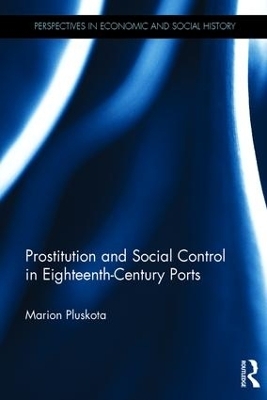
Prostitution and Social Control in Eighteenth-Century Ports
Seiten
2015
Pickering & Chatto (Publishers) Ltd (Verlag)
978-1-84893-561-7 (ISBN)
Pickering & Chatto (Publishers) Ltd (Verlag)
978-1-84893-561-7 (ISBN)
In her comparative study, Pluskota looks at how the role of prostitutes is redefined beyond that of the criminal and placed within their families, neighbourhoods and larger social networks. Using police and judicial records, she provides a valuable corrective to the narrow analysis of prostitutes in terms of immorality or deviance.
In the last third of the eighteenth-century, Bristol and Nantes were two of the most active commercial ports of England and France, despite a slowdown of their economy. Their economies were based primarily on the maritime trade, but they developed alongside Atlantic industries that attracted many migrants, both male and female, from the surrounding countryside and from abroad. The busy urban environment, the high number of sailors and single men migrating to the port, and the decline of female house based proto-industries, were factors encouraging the development of prostitution.
How prostitution is perceived in the context of social control and urban change is key to understanding the evolving attitudes to gender and sexuality in the eighteenth century. In this comparative study, Marion Pluskota offers an analysis of the lives of prostitutes that looks beyond a purely criminal perspective, and which encompasses their roles within their families, relationships and social networks. Using police and judicial records, she provides a valuable corrective to the narrow analysis of prostitutes in terms of immorality or deviance.
The unique forms of development and problems faced by port cities in the early modern period make them particularly interesting subjects for comparative history. This book is well suited for those who study social history, gender and women’s history.
In the last third of the eighteenth-century, Bristol and Nantes were two of the most active commercial ports of England and France, despite a slowdown of their economy. Their economies were based primarily on the maritime trade, but they developed alongside Atlantic industries that attracted many migrants, both male and female, from the surrounding countryside and from abroad. The busy urban environment, the high number of sailors and single men migrating to the port, and the decline of female house based proto-industries, were factors encouraging the development of prostitution.
How prostitution is perceived in the context of social control and urban change is key to understanding the evolving attitudes to gender and sexuality in the eighteenth century. In this comparative study, Marion Pluskota offers an analysis of the lives of prostitutes that looks beyond a purely criminal perspective, and which encompasses their roles within their families, relationships and social networks. Using police and judicial records, she provides a valuable corrective to the narrow analysis of prostitutes in terms of immorality or deviance.
The unique forms of development and problems faced by port cities in the early modern period make them particularly interesting subjects for comparative history. This book is well suited for those who study social history, gender and women’s history.
Marion Pluskota is a Post-Doctoral Researcher at the Institute for History, Leiden University, the Netherlands.
Introduction I. Social origins and family ties of port prostitutes II. A widening sphere? Prostitutes and labour relations in a port environment III. Prostitutes and police territorialisation: from informal control to a better supervision of the population IV. Prostitution and criminality: when informal control is not enough. Community, police and the court’s interactions with prostitutes V. Spatial distribution of prostitutes: Agency and appropriation of the urban space Conclusion. The elites and the prostitutes of the ports.
| Erscheint lt. Verlag | 17.11.2015 |
|---|---|
| Reihe/Serie | Perspectives in Economic and Social History |
| Zusatzinfo | 8 Tables, black and white; 3 Line drawings, black and white; 3 Halftones, black and white; 6 Illustrations, black and white |
| Verlagsort | London |
| Sprache | englisch |
| Maße | 156 x 234 mm |
| Gewicht | 385 g |
| Themenwelt | Geschichte ► Allgemeine Geschichte ► Neuzeit (bis 1918) |
| Geisteswissenschaften ► Geschichte ► Regional- / Ländergeschichte | |
| Geschichte ► Teilgebiete der Geschichte ► Kulturgeschichte | |
| Geschichte ► Teilgebiete der Geschichte ► Sozialgeschichte | |
| Sozialwissenschaften ► Soziologie | |
| ISBN-10 | 1-84893-561-7 / 1848935617 |
| ISBN-13 | 978-1-84893-561-7 / 9781848935617 |
| Zustand | Neuware |
| Haben Sie eine Frage zum Produkt? |
Mehr entdecken
aus dem Bereich
aus dem Bereich
Europa 1848/49 und der Kampf für eine neue Welt
Buch | Hardcover (2023)
DVA (Verlag)
48,00 €
Giordano Bruno - ein ketzerisches Leben
Buch | Hardcover (2024)
C.H.Beck (Verlag)
29,90 €


